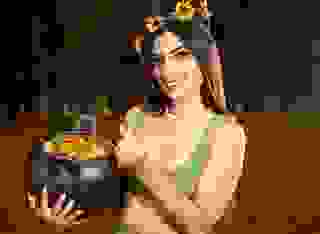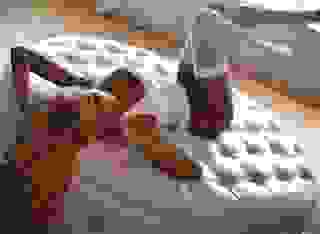Note: You can change font size, font face, and turn on dark mode by clicking the "A" icon tab in the Story Info Box.
You can temporarily switch back to a Classic Literotica® experience during our ongoing public Beta testing. Please consider leaving feedback on issues you experience or suggest improvements.
Click here"Chilon!" the girl screamed, her voice filled with all the fear and despondency of one who is helpless to act.
He knew that those mournful cries could have come from none but Tethys herself, for the image of her beautiful face had never left him, even with the passage of so many years.
"Tethys!" he screamed back at the distraught girl, as the ship's prow dipped once again into the brine.
The Helios was now being pummeled on every side by the onslaught of wind, rain, and sea. Soon, another great wall of water crashed into the aft side of the distressed ship, forcing it further up the channel. Recovering from this last assault, the Helios had come dangerously close to the eastern coastline and would have run aground if not for the diligence of her crew who, at the last minute, steered her clear of the rocky shoals. When Chilon was once again able to open his eyes, he turned his head toward Megara only to find that it was now far behind him, its walls shrinking fast into the horizon as the ship was carried against its will into the open expanse of the Black Sea.
Whether by an insensate act of nature, or by the will of some charitable god, the Helios had been spared the fate of many vessels that had met their doom on the rocky shores of Megara. Despite this, the ship had lost almost half its crew, including Demetrius, who Chilon had seen picked up and hoisted high into the air by a giant wave that took him, and several others, to their watery deaths. He looked at Polyphemus, still clinging desperately to the mainstay, his lamentations for his hapless friends lost in the deafening roar of the swell.
"Demetrius! Aristocles! Hyperion! Pytheus!" the shipmaster wailed, cursing the ocean and the entire panoply of the Olympian gods for the senseless destruction of his companions. But his doleful cries were cut short as another great wave swept over the ship. To his horror, Chilon watched as the shipmaster was hauled up into the air with great force on the back of the giant wave and carried headfirst out into the black, raging waters, where he quickly disappeared from view. Chilon called out to him again and again, but to no avail. His friend was gone.
A great feeling of despair now crept over him as he clung to the mast with the last remnants of his strength. The ship was now at the complete mercy of the winds and water, and those few men remaining to handle the oars could no longer prevail against the unrelenting storm. The Helios, now under the control of gale force winds coming from the west, skirted the southern shore of the sea in an easterly direction toward the coast of the land the Greeks called Paphlagonia. It was on these shores that the final blow to the Helios was delivered.
It must have seemed to Chilon that the ship was now nothing more than a plaything in the hands of an angry and mischievous god. For without warning, the wind
suddenly changed direction so that they were now proceeding from the northwest, and the tremendous power of the hurricane turned the ship hard about so that her bow was now facing west. Lightning bolts pierced the heavens above, slicing through the pitch-black void to illuminate the hostile sea of which he was now a prisoner. And far away to the south he could see the rugged coastline with its ominous outcroppings of rock; silent, unfeeling monoliths that waited patiently as the luckless ship was being driven toward the shore and its destruction.
Chilon saw that there were still a few men yet alive on deck, but they had long since abandoned their oars along with any chance of maneuvering their ship to safety. They clung now to any secure beam they could find, offering prayers to their gods in strident voices that sent a chill through Chilon's heart.
The Helios now found herself in shallow waters and her hull was taking a beating. Suddenly, from the dark, swirling miasma a giant reef appeared as if out of nowhere, and the floundering vessel, now thrashing about in its final death throes, crashed into the rock on its port side. The great ship groaned in agony as its hull was ripped open, splitting the vessel in two just a few feet before the mainmast. The men in the forward section screamed in terror as they watched themselves slip away from Chilon, who was now all alone, clinging to the mast for his life. In a matter of seconds, the cries of the men were silenced as the forward part of the ship was dashed to pieces on the rocks and their bodies flung headlong into the ocean.
Miraculously, the mast he was clinging to was still intact; the ship now being driven further up the coast in a southeasterly direction. But the Helios was sinking fast. With the shore only less than a half mile away, Chilon could no longer wait. As the vessel began to sink beneath the waves, he hurled himself into the black waters and started to swim toward the shore.
He was exhausted. The toll taken upon his physical and mental energies had been tremendous, yet he swam on. Halfway to the shore he saw something like a man's face peering at him from the illumination provided by the intermittent lightning bolts. It was the face of the god, Helios. Chilon swam to the drifting piece of wood, once the proud figurehead that had protected the shipmaster and his crew, and wrapped his arms around it, gasping for breath. All around him floated bits and pieces of the ill-fated ship.
It took all of his remaining strength to reach the shore. Too tired to stand, he crawled beyond the rock-strewn coastline and onto higher ground, where he found some protection by hiding in a small cove. He saw that both his hands and knees were raw and bleeding, and that there was blood dripping from his forehead.
The awful tempest continued to rage as he laid shivering and sobbing upon the cold sand. He had long since lost his robe and sandals, his only protection being his sodden woolen tunic. The image of Tethys, her desperate pleas still ringing in his ears, and the thought that he might never see her again, filled his heart with great sorrow. He felt sorrow too for his friend Polyphemus and the rest of the unfortunate crew, who had done nothing to deserve the terrible fate meted out to them by the gods who ruled the sea. And as he lay there contemplating these things, his eyes began to dim as merciful oblivion overtook him.
************
Chilon awoke to the sound of gulls flying overhead. He opened his eyes slowly and saw a flock of them land about a hundred yards from where he lay, still in pain from the bruises he had received to his head and extremities the night before. The sun had not yet reached its highest point in the sky, and he reckoned it must have been mid-to-late morning. He was still feeling unsteady from the wound he had received to his head, but the sun's warmth had acted as a balm upon his weary and beaten body, and he slowly rose to his feet, embracing the healing rays as if embracing a long lost friend. The shelter of the cove had saved his life, and he silently thanked the unknown god or goddess who had led him to this place.
As he looked out toward the beachhead, he saw that the gulls had congregated around one particular area, fighting and squabbling amongst each other for possession of some obscure artifact. He took a few steps towards them but fell down on one knee, grasping his head with both hands, dizzy and disoriented. In a short while the feeling passed, and when he looked up again he beheld a shimmering, blue-green sea, now quiet and serene. Its very placidity mocked him. For having expended its fury upon the Helios and its crew with vengeful exactitude the night before, it had satisfied the blood lust of its immortal, abyssal denizens--those sons and daughters of Poseidon who dwelled in the enigmatic submarine world that had now become the final resting place of Polyphemus, Demetrius, and the rest of the crew. He now understood why the shipmaster had been reluctant to sail these waters. For what seemed a calm and inviting ocean one moment, could abruptly change into a churning cauldron of death the next.
The gulls were still fighting; their cries resounding off the rocky shoreline and echoing loudly in his ears. He rose to his feet again, this time unencumbered by any feeling of dizziness, and walked out from the protection of the cove into the direct sunlight.
He had to shield his eyes from the glare of the white sand, which acted like a giant mirror of polished brass, reflecting the sun's dazzling brightness. He walked slowly, deliberately, toward the birds, feeling his way like a blind man, his eyes unaccustomed to the harsh light of day.
But before he could get very far he became aware of another sound; this time coming not from the sea but from somewhere behind him, beyond the sets of dunes that ran parallel to the shoreline directly inland from the beach. The sounds were light-hearted, gay, and musical, like the sound of girlish laughter. They flitted on the winds like feathers floating on a gentle zephyr, titillating in their quaint, feminine undertones.
Chilon turned his gaze toward the barrier of sand and, shielding his eyes from the glare, saw what he believed to be were three women on horseback, all wearing gray, short sleeve tunics and without sandals. He thought of hailing them, then thought the better of it and scrambled back into the cove.
The laughter grew louder as the women approached, and the gulls, having become aware of the interlopers, abandoned their squabbling and took to the air. The women left their horses at the edge of the dunes and ran toward the exact area which the gulls had begrudgingly vacated. They seemed excited about something, for they shouted and clasped each other with joy at their discovery.
"I saw it first!" one of them exclaimed as she danced around in a circle before the laughing girls.
The other two women were in no mood to debate the issue as they fell to their knees and said a short prayer to the ocean gods who had favored them with this mysterious gift from the sea. It startled Chilon to hear them speaking Greek; not the semi-literate Greek often spoken by barbarians on the fringe of civilization, but the Ionic dialect spoken by people on the Greek mainland. Another thing that struck him was their coarse woolen tunics, which were not worn at ankle length, but cut short to end just above the knees like those of a man. But the most fascinating thing of all was their height. They were not like most Greek women who stood only a few inches above five feet. These three were considerably taller, possibly five to six inches taller than their Greek counterparts. And they were fairer in complexion, with blonde, red, or light-brown hair and light-colored eyes. All in all, they seemed to him quite beautiful.
After the women had offered up their prayers to the sea gods, the one who had made the discovery ran toward the shoreline where she found a large rock, and returned to her friends cradling the heavy object in both hands.
"I saw it first and I'm going to be the one to open it!" she declared.
"You are such a silly fool, Anaea!" her friend with the tawny hair replied. "You may have seen it first, but it does not belong to you! It's a gift from the gods and it belongs to all of us!"
"But I want to open it!"
"Let her open it, Clymene," the blonde woman said. "What difference does it make?"
Chilon's curiosity had now grown so great that he was prepared to risk detection rather than stay one moment longer protected by the darkness of the cove. He crawled out on his hands and knees toward the trio, making sure to use the rocks as a natural barrier between himself and the women.
As he drew nearer, he discovered the source of their excitement. It was a wooden chest nine feet long and four feet wide, its entire surface covered over with pine tar resin, making it waterproof. The chest, whose front was facing toward him, was fastened by a huge iron padlock and was marked with the emblem of his father's house: the hideous, snarling image of the Medusa. His heart leapt for joy when he saw the ugly face of the Gorgon, but having no weapons, and still recovering from his ordeal, he could do little more than wait and assuage his curiosity.
He watched as Anaea lifted the rock above her head and then brought it down hard upon the padlock, but the lock proved too formidable to break. She tried several times to dislodge it, but without success. Finally, seeing she was getting nowhere, she swallowed her pride and asked her two friends to help her.
It took much effort to break the lock, but their combined efforts finally managed to do it. Tittering with a child's eagerness of opening an anticipated gift, she pushed the other two women away and gingerly lifted the lid.
"By the immortal gods!" she cried. "Clymene! Xanthippe! Look!"
The invitation hardly needed to be made since both women were already on their knees rummaging through the chest's contents. They found articles of clothing, a few papyrus scrolls, three pairs of sandals, several silk tunics dyed in various colors, and other assorted items, amongst which was an emerald necklace meant for Chilon's betrothed.
"Have you ever seen anything so beautiful?" Anaea exclaimed, as she placed the necklace around her neck and fastened the clasp. "I think I'll keep it for myself!"
"No you won't!" Clymene said. "That is for Lysippe to decide."
"Well, anyway, I want to wear it. At least until we get back to the city. I've never had any of my own jewelry."
"Give it to me," Xanthippe said to the girl. "I want to look at it."
Reluctantly, Anaea removed the necklace and gave it to her friend.
"This is a very intricate design," Xanthippe said. "It couldn't have been made by our people."
"Maybe, it's Persian," Clymene offered.
"I don't think so. It's obviously a high level of workmanship, but it's not ornate like Persian jewelry."
"It's definitely not Persian," Anaea said, her face looking down into the chest.
"How do you know?" Clymene asked her.
Without answering, Anaea reached down into the chest, her fingers struggling to clutch the rim of a giant bronze shield whose size was easily over three feet in diameter.
"I can barely lift it," she complained. "Help me."
Chilon watched eagerly as the three women removed the shield from the chest. The great weight of it was more than any one of them could handle effectively, and they simply let it fall onto the sand, its embossed side face up.
"I've never seen a Persian shield made of bronze," Anaea said, running her hands over the polished surface.
"It looks like a Greek shield." Clymene said, staring at it in wonderment.
"Actually, it's a hoplon," Xanthippe replied. She pointed to the inverted "V" on the front of it. "Only the Spartans use this symbol on their shields."
"The Spartans?" Anaea's voice suddenly sounded less musical.
"Don't you remember the stories? Our ancient ones describe such a shield used by the Spartans when they fought at Troy."
"What would a Spartan shield be doing in a chest given to us by the sea god?"
"It is not a gift of the sea god, Anaea. It's someone's personal belongings whose ship must have gone down at sea. The only reason it didn't sink is because of the pine tar. It kept it watertight."
"It was a terrible storm last night." Clymene reflected. "The gods were angry."
Xanthippe nodded. "Very angry."
The three women returned to removing the remaining contents of the chest, briefly examining each item before flinging them onto the sand. What they found was a bronze, muscled cuirass, a helmet with its horsehair plume dyed red, bronze greaves, a nine-foot-long spear, and a thick, curved iron sword, which Chilon recognized as his kopis, a vicious hacking weapon. Resting on the bottom of the chest was a long crimson cloak and a crimson tunic made of combed wool. Xanthippe held the cloak in her hands and rubbed the fabric against her cheek.
"Maybe this is a gift from the sea god after all," she said wistfully.
"What do you mean, Xanthippe?" Clymene asked.
"If these are the weapons of a Spartan warrior, then Poseidon did us a great favor by drowning him at sea."
"But what if he didn't drown?" Anaea asked, her eyes anxiously searching the coastline. "What if he still lives?"
"I doubt very much that anyone foolish enough to sail our great sea last night would now be alive to tell of it. Come. Let us take these things back to the city. They will make a worthy offering to Artemis."
"I don't care what you offer her," Anaea said, as she placed her hand on the precious green jewel around her neck, "as long as I get to keep the necklace."
"By rights, all of these things belong to the goddess. But if you insist, you'll have to take the matter up with Lysippe."
Chilon found himself in a quandary. He could not let them rob him of his possessions, but he had no desire to hurt the women in order to regain them. He was tired and thirsty, with no weapons to bear, and these three strong women could easily kill him with his own weapons if they so chose. And he believed they would. They obviously did not like Spartans very much, as the one named Xanthippe had clearly intimated. But why? Why should she hate the Spartans? Why had she wished he were dead?
"This is too much for us to carry," Clymene said. "We'll have to load up the horses and walk home."
As the women turned to leave, Chilon breathed a little easier. He knew that their departure, although brief, would buy him enough time to put on his armor. And once armed, they would think twice about stealing his goods.
Once the women were out of sight, he quickly made his way to the chest and threw off his bloody and damaged tunic, replacing it with his crimson military one. He then donned his armor, with the exception of the cuirass, which he found to be too heavy to bear, and armed himself with his kopis and spear. The shield, once so light and maneuverable, now seemed almost too much of a burden, but it had saved his life on more than one occasion and he refused to abandon it.
While in the midst of his exertions, he kept an eye on their movements toward the dunes. At one point, one of them, Xanthippe, looked back, and she might have seen him, but the powerful glare of the sun, and the relative distance between them, acted in his favor. Suddenly he heard one of them shout. He recognized it as Anaea's voice, the one wearing Tethys' necklace.
"Mariandyni! Mariandyni!" she cried, pointing toward the west where six armed men on horses were approaching quickly from behind the dunes, not far from where the women's horses had been left.
"In our haste we left our weapons with the horses!" Clymene wailed. "We are fools!"
The three women rushed up the dunes toward their horses just as the Mariandyni fell upon them. Seeing the women were unarmed, the men laughed, dismounted, and threw their spears on the ground, believing they had come upon easy prey. Anaea, the youngest and least swift of the three, was the first to be captured, held down by two of the warriors as another removed his tunic in preparation to mounting her. She screamed for help but her two friends were busy fighting off the other three men, trying in vain to reach their bows and arrows that they had thoughtlessly left behind. But the men were too powerful for them and knocked both women to the ground, preparing them for a similar fate to that of their hapless friend.
Both Xanthippe and Clymene fought bravely against their vicious attackers, using their teeth and nails to inflict serious wounds upon the men's exposed flesh. But their tactics only served to incite the men further, and both women were savagely beaten until they were almost unconscious.
Chilon knew little of these lands and its inhabitants. But Polyphemus had told him stories about two particularly savage tribes, the Thyni and the Bithyni, the latter of which had been conquered by a fierce warrior race, the Mariandyni, of Thracian origin. These warriors had made incursions into Paphlagonia from their homeland of Bithynia in the northwest of Asia Minor. Their preferred tactic was to pirate those few Greek coastal cities along the southern area of the Black Sea, but they did not limit their rapacity to those colonies on the shore. Occasionally they would send contingents of cavalry to invade from inland routes through the mountains, reconnoitering the area prior to launching a full-scale attack. What he was now seeing was one such contingent. Their round wicker shields, leather body armor, and bronze helmets with their high and forward-inclined apex, had been adequately described by Polyphemus, who claimed that these Thracian warriors were completely barbaric and bloodthirsty, showing mercy to no one, which was the very reason he had shunned that part of the world despite the fact that several Greek colonies had established themselves there a hundred years before.








